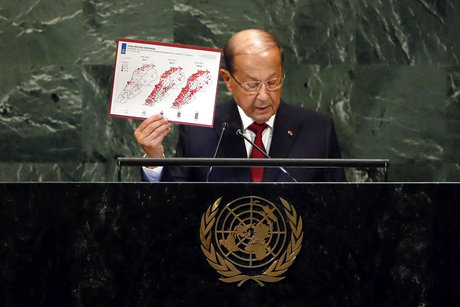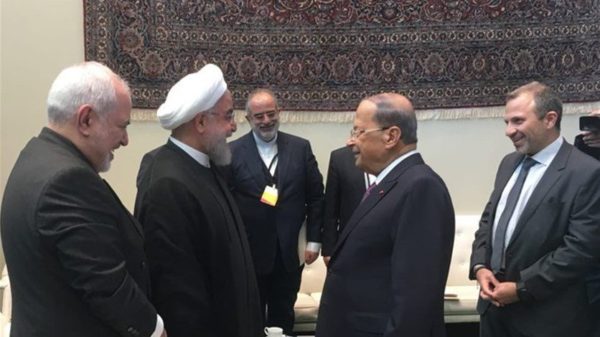
UN The President of Lebanon told the United Nations General Assembly’s annual general debate on Wednesday that Syria’s displacement crisis has had repercussions on his country’s “security, political, social, economic and environmental spheres”.
“This displacement has posed a serious threat to the achievement of the Sustainable Development Goals (SDGs) agenda in Lebanon and led to the aggravation of its economic crisis”, said Michel Aoun, adding that the fallout also includes infrastructure and an increase in Lebanon’s unemployment rate.
As Lebanon strives to confront its difficult economic situation, relying on “drastic structural measures and reforms to its economic and financial system”, President Aoun called on the world leaders to work for the safe return of the displaced.
“Addressing this crisis is certainly not the sole responsibility of Lebanon,” he underscored, but a “shared international responsibility…for all of us to collaborate together to urgently find solutions”.
“The international community cannot content itself with providing minimum assistance to the displaced and refugees in their regions of displacement only, while excluding programmes for their safe and dignified return”, he stressed.
The Lebanese President pointed out that the security situation in most of Syria has become stable, with military confrontations confined to the Idlib region. But while Syria has officially welcomed return of its displaced citizens, he said that of the more than 250,000 displaced who have returned from Lebanon to Syria, the feedback was that “they have not been subject to persecution or mistreatment”.
“We have many question marks about the positions of some active States and concerned international organizations, trying to hinder this return, the allegations that the security situation in Syria is dangerous, and sowing fear among the displaced…as if the displaced have become hostages in an international game to be swapped when settlements and solutions are imposed!”, he criticized.
Aoun stressed Wednesday that Lebanon rejects “any naturalization scheme” for the around two million Syrian and Palestinian refugees who live in the country.
“We categorically reject any naturalization scheme for (Palestinian) refugees or the displaced (Syrians),” Aoun said .
“I reiterate that my country is seeking a dignified, safe and sustainable return of the displaced to their homeland and we reject any procrastination or bargaining over this existential file… It should not be linked to a political solution whose timing remains vague,” the president emphasized.
Rich versus weak
The Middle East remains a constant flashpoint for war, “where temperature rises or drops but never cools down, and our people always pay the price, with their security, stability, peace, economy and even demographic diversity”, the Lebanese President said.
“The core of the problem is the same: contradiction between the interest of the strong and the right of the weak; thus principles, logic and justice are lost, and solutions are diluted”, he lamented.
Asserting that the UN has undertaken many initiatives aimed at making the voice of peace and development heard, he expressed hope that the UN will promote international law and the Charter as “the only reference to safeguard the rights, for no justice shall rise, no right shall be consecrated and no peace will be established, as long as the principle prevailing in our world is: I am strong, then I am right!”, concluded President Aoun.
Injustice leads to war
Criticizing the Trump administration’s decision to recognize Jerusalem as the capital of Israel while cutting aid to Palestinians and to the U.N. agency for Palestinian refugees, Aoun said that “history has taught us that injustice leads to war.”
“Absence of justice can lead to violence and terrorism,” he warned.
“Unfortunately, international political approaches to the Middle East still lack justice and there are double standards in this regard. The Palestinian question is an example of that,” Aoun lamented.
Israeli violations
The president renewed his condemnation of Israeli violations of U.N. Security Council Resolution 1701, saying that they have “never ceased, and neither have the exaggerated aggressions against Lebanese sovereignty, by land, sea and air.”
Resolution 1701 calls for the full withdrawal of Israel from Lebanese territories, and Aoun reminded the international community of Lebanon’s sovereign rights over the occupied Shebaa Farms, Kfar Shuba Hills and northern Ghajar.
Iran

The meeting was held in the presence of Minister of Foreign Affairs Gebran Bassil and his Iranian counterpart Mohammad Javad Zarif.
After his speech, Aoun met with Iranian President Hassan Rouhani, and they reportedly “discussed bilateral ties and the latest regional developments.” Aoun is a close ally of the Iranian-backed Hezbollah militant group
Before his speech, Aoun met with United Nations Secretary-General Antonio Guterres, who told him that the U.N. supports “Lebanon’s sovereignty, independence and the safety of its territories.”
“[The U.N.] will do everything it can in order to help achieve these goals,” Guterres told Aoun during a meeting between the two at the U.N. headquarters in New York.
UN/ agencies

Leave a Reply
You must be logged in to post a comment.